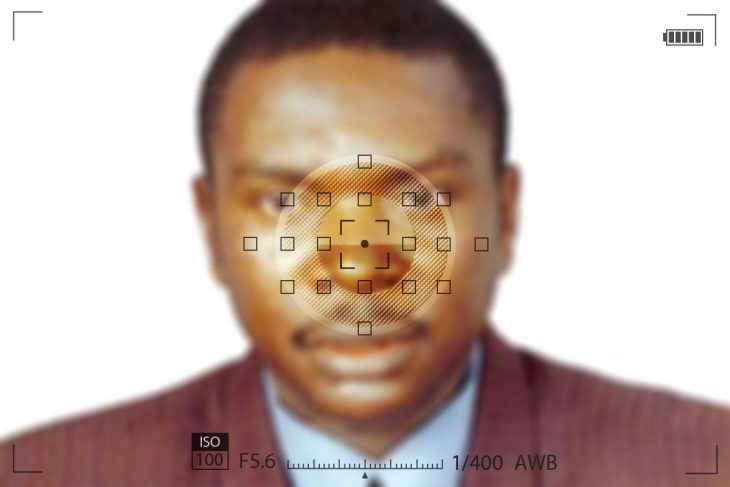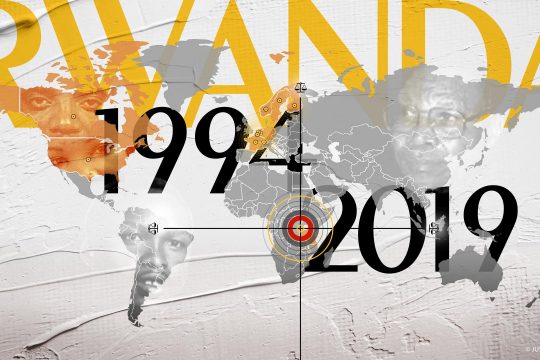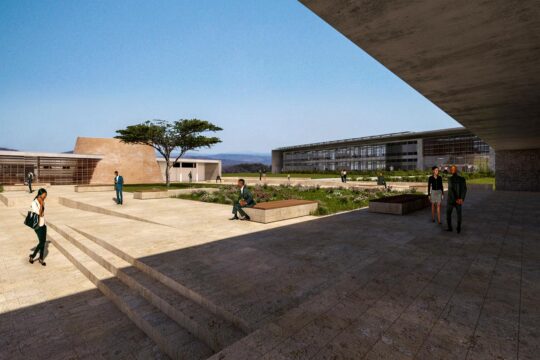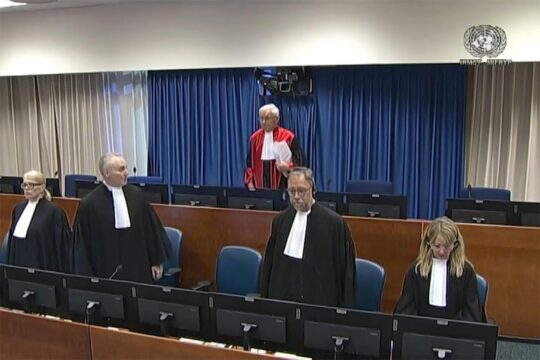“I know I'm wanted everywhere. The black list with my name underlined in red is circulating here and there. It seems my time has not yet come, otherwise I would be with the other co-defendants." Thus wrote Protais Mpiranya in a book attributed to him and published "posthumously" in 2010 by Editions Sources du Nil, under the title "Rwanda, the lost paradise. Last secrets of the ex-commander of the Presidential Guard of J. Habyarimana" [President Juvénal Habyarimana, killed in an attack on 6 April 1994].
Mpiranya is now the first name on this "black list". After the arrest of Félicien Kabuga in Paris on 16 May and the confirmation, a week later, of the death of former Rwandan Defence Minister Augustin Bizimana, the former head of the Presidential Guard is the number one target of international justice.
“A strong understanding of where he is hiding”
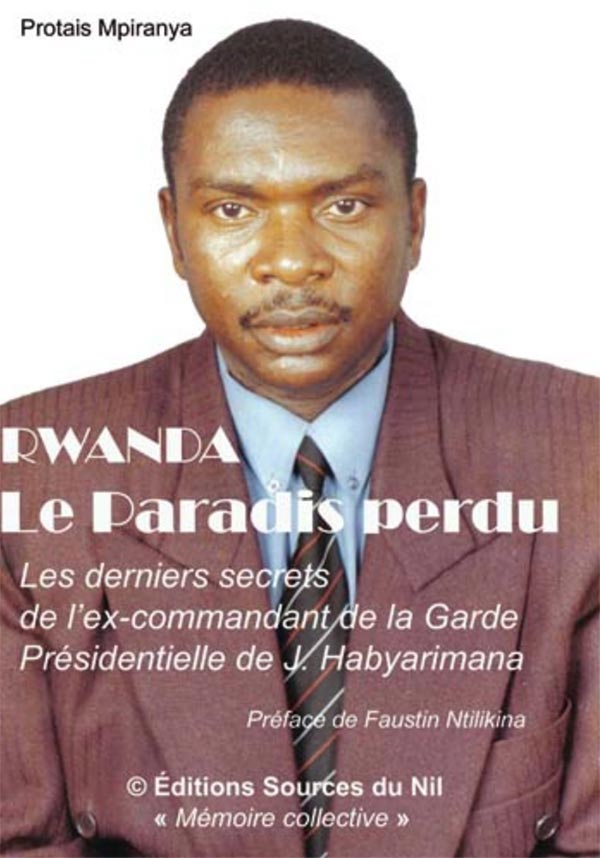
At the beginning of the book "Rwanda, the lost paradise", it is said that Mpiranya, indicted for genocide by the International Criminal Tribunal for Rwanda (ICTR) in 2000, died a natural death on 5 October 2006. "Stricken by illness during this ordeal of solitude, it was while courageously fighting an unequal battle against fate that he sent me a script recounting what he experienced, saw or heard about the hell that Rwandans are living through," says in a preface Major Faustin Ntilikina, secretary to the chief of staff of the Rwandan army in April 1994 and former battalion commander, who now lives in France. The preface does not indicate the illness that Mpiranya supposedly died of, or where he allegedly died.
Two months after the book's publication in December 2010, ICTR Prosecutor Hassan Bubacar Jallow told the UN Security Council that Mpiranya had been reported more than once to be in Zimbabwe. "There are indications that Mpiranya has connections with Zimbabwe and has resided there on several occasions," said the Gambian magistrate, supporting reports in the Zimbabwean press.
But there is nothing to confirm or disprove Mpiranya's death. Today Serge Brammertz, Belgian Prosecutor of the International Residual Mechanism for Criminal Tribunals (IRMCT) - the body that succeeded the ICTR after its closure in 2015 - is certain that Mpiranya is not dead. “I have been clear that the search for the remaining fugitives – and Mpiranya in particular – remains our highest priority,” Brammertz wrote to Justice Info on 18 May. “Through our intensified investigations over the last three years, we have developed a strong understanding of Mpiranya’s movements and where he is hiding. Our task now is to obtain the necessary cooperation from relevant countries.”
Assassinations of 7 April 1994
Protais Mpiranya, now 60, comes from the same region as former President Habyarimana. After graduating from the Ecole Supérieure Militaire (ESM) in Kigali in 1983, he was assigned to the national gendarmerie. In 1991, while the Rwandan Armed Forces (FAR) were battling the rebels of the Rwandan Patriotic Front (RPF), Mpiranya was transferred to the Presidential Guard battalion. Two years later, he was promoted to commander of that unit. After the defeat of the FAR in July 1994 and the RPF's seizure of power, Mpiranya reportedly circulated in several African countries. According to the NGO African Rights, the former officer fought in 1998 alongside the Congolese Armed Forces against Congolese rebels supported by the new Rwandan government. According to African Rights, he was later sent to Zimbabwe to establish business ties on behalf of the Forces Démocratiques de Libération du Rwanda (FDLR), a Rwandan armed rebel movement accused of exploiting the minerals that abound in the eastern Democratic Republic of Congo (DRC).
In January 2000, the ICTR confirmed the indictment against Mpiranya for genocide, crimes against humanity and war crimes. The document alleges that elements of the Presidential Guard, acting under the orders of Major Mpiranya, participated in the kidnapping and murder of opposition leaders on the morning of 7 April 1994. Among the victims were Prime Minister Agathe Uwilingiyimana and the President of the Constitutional Court, Joseph Kavaruganda. The accused is also alleged to have played a role in the killing by regular army soldiers of 10 Belgian peacekeepers in the centre of Kigali. In his book, Mpiranya denies these allegations. "I learned along with everyone else about the deaths of some members of different political parties, including MRND, the party of President Juvenal Habyarimana. What I cannot understand is the fact that some 'specialists' and some media have attributed these facts, including the death of the head of state, to the presidential guard, which was besieged by an army of heavily armed invaders," he wrote.
The South African trail
The hunt for this key player in the events of 1994 began under former ICTR Prosecutor Carla Del Ponte. But both the Swiss magistrate and her successor Jallow turned up a blank. Brammertz seems confident that he can succeed where his predecessors failed.
Brammertz refuses to reveal the country where he thinks Mpiranya is now. In his last two reports to the Security Council, he implicates South Africa and Zimbabwe, but without specifying which country he thinks is harbouring which of the six fugitives indicted by the ICTR and still on the run. The latest report, dated 15 November 2019, focuses on South Africa. “The Prosecutor deeply regrets that South Africa has not yet arrested and transferred a wanted fugitive indicted for the crime of genocide,” writes the Prosecutor. “For more than a year, and with the full knowledge of the South African authorities, the fugitive has remained at liberty in South Africa, facing no judicial proceedings and seemingly under no measures to ensure he does not have the opportunity to flee again. As of the time of writing, despite extensive attempts by the Office to engage with the South African authorities and resolve the matter, no other conclusion can be drawn except that South Africa is failing to provide cooperation in accordance with the statute of the Mechanism and numerous resolutions of the Security Council”.
On 11 December, Brammertz again complained strongly to the Security Council. This time he only targeted South Africa. Who is the fugitive he has in mind? Is it Mpiranya? "I never mention the names of the fugitives we're looking for, but I noticed that several newspapers at the time mentioned the name you raised," Brammertz replied in an interview with Jeune Afrique magazine on May 22. "It is not necessarily correct, so I can't confirm that it is him."
Mpiranya is still on the run, but the net seems to be closing around him more than ever.
THE OTHER ICTR INDICTEES STILL ON THE RUN
Félicien Kabuga has been under lock and key since May 16. The death of former defence minister Augustin Bizimana was confirmed on 22 May by the IRMCT prosecutor. A DNA test finally made it possible to verify that Bizimana had indeed died 20 years ago in Pointe-Noire in the Republic of Congo, information that had circulated at the time and was deemed credible.
In addition to Mpiranya, the Mechanism is now seeking five other individuals indicted by the UN Tribunal for Rwanda (ICTR) for their alleged role in the 1994 Tutsi genocide. If arrested, Mpiranya, like Kabuga, is expected to be tried by the Mechanism. The other five, on the other hand, would be transferred to the Rwandan justice system, to which their files have already been handed over.
Phénéas Munyarugarama
In 1994, this lieutenant-colonel commanded the large military camp of Gako, east of Kigali, near the border with Burundi. According to the ICTR, soldiers from the Gako camp committed crimes in their neighbourhood. Munyarugarama is also said to have been present at the Nyamata church when between 2,500 and 5,000 civilians were massacred there on 14 April 1994 by soldiers from his camp and Hutu militiamen.
Fulgence Kayishema
Fulgence Kayishema's name is often associated, in numerous testimonies before the ICTR, with the massacre of Tutsis who had sought refuge in the church of Nyange in western Rwanda. According to the indictment, Kayishema, then a police inspector in the commune of Kivumu, allegedly helped gather the Tutsis of the commune in the church of Nyange with a view to exterminating them. Witnesses in other trials at the ICTR have claimed that Kayishema went to fetch fuel used by the militia to set fire to the church.
Aloys Ndimbati
At the time of the events, Aloys Ndimbati was the mayor of the commune of Gisovu. He is accused of having played a leading role in the systematic extermination of Tutsis in various locations in the prefecture of Kibuye, in western Rwanda. In particular, he is said to have transported gendarmes and militiamen during attacks on the hills of Bisesero, to have given the order to kill the Tutsis who had taken refuge there and to have personally killed some of them. Having met fierce resistance from the Tutsis, who defended themselves with traditional weapons, the attacks on Bisesero lasted several days, causing tens of thousands of deaths.
Charles Sikubwabo
Charles Sikubwabo was appointed mayor of Gishyita commune in 1993 and held this position until July 1994, when the genocide ended. Prior to that, he had served in the Rwandan army as a chief warrant officer. According to the indictment, in April 1994, he allegedly ordered elements of the national gendarmerie, the communal police and Interahamwe militiamen to attack the church of Mubuga. The attack caused thousands of deaths among the Tutsis who had taken refuge there. Charles Sikubwabo is accused of having personally taken part in some of the attacks.
Charles Ryandikayo
At the time of the events, Charles Ryandikayo was the manager of a small restaurant in Mubuga, Gishyita commune. This small business assured him a certain social status in this poor commune in western Rwanda. According to the indictment, the restaurateur allegedly participated in and was present at massacres of Tutsis between 8 April and 30 June 1994, in particular at the church in Mubuga where thousands of Tutsis were massacred between 14 and 16 April 1994.


